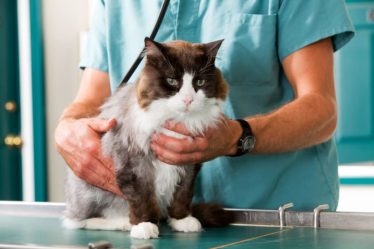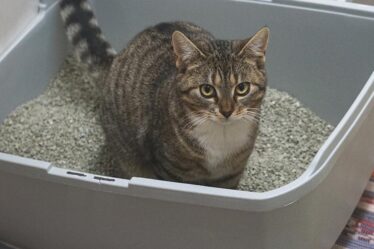
Maine Coon kittens have become increasingly popular in recent years due to their gorgeous appearance and sweet personality. The Maine Coon cat has a special place in the heart of cat lovers.
With its luxurious coat, long tufted ears, and extra-large size, Maine Coon kittens are sure to capture the hearts of all cat lovers. However, one question looms large for prospective owners: are Maine Coon kittens hypoallergenic?
Let’s get into this enigma and separate fact from fiction!
Understanding Hypoallergenic Cats
One of the most common misconceptions about hypoallergenic cats is that they are all free of allergens. No cat breed is 100% allergenic, but some produce less of them than others.
Most of these allergens come from Fel d 1, a protein in a cat’s saliva, skin, and urine. When your cat grooms itself, this protein migrates to its fur, where it can cause allergic reactions in people with sensitive skin.
European Maine Coon Kittens: Unraveling the Myth
Maine Coon kittens are a popular choice for many pet parents who are looking for a hypoallergenic cat. It is often said that Maine Coon kittens are less likely to produce allergens, making them suitable for people with allergies. However, this is only sometimes the case.
Several factors can affect the allergens produced by a Maine Coon kitten. Gender plays a significant role in the allergen level of a kitten. Male cats tend to produce more allergens compared to females.
Intact males also tend to produce higher allergen levels compared to neutered males. There are also individual variations in allergen levels, meaning that some kittens may produce more allergens than others.
The Truth About Hypoallergenic Claims
The science of hypoallergenicity of Maine Coons is still unclear. While some people with allergies may be able to tolerate Maine Coons more effectively than other cat breeds, there’s no guarantee that they won’t won’t cause allergic reactions.
Everyone’s sensitivities to cat allergens vary greatly, so it’s hard to say that any cat breed is hypoallergenic.
Factors Affecting Allergen Production
Several factors influence the allergen production of cats. These include the individual cat’s grooming habits, the frequency of shedding, and the time spent indoors. Therefore, even within the same breed, allergen levels may vary from one cat to another.
The Maine Coon’s Luxurious Coat
Maine Coons boast a distinctive coat that sets them apart. Their fur is long, thick, and dense, with a double-layered structure. Despite their impressive fur, Maine Coons are not officially on the “Hypoallergenic cats” list.
Here’s why:
Fel D1 Production
Maine Coons, like most cats, secrete the standard amount of the allergen Fel D1. Fel D1 is naturally present in the cat’s skin, saliva, and fur. During grooming, cats shed saliva onto their fur, which helps to transport Fel D1.
Shedding Behavior
Shredded hair plays a significant role in triggering allergies. The excellent news for cat-allergy-sensitive individuals is that Maine Coons do not shed as much as other breeds. Their reduced shedding minimizes the dispersion of allergens throughout the home.
The Science Behind Cat Allergies
- Cat Saliva: Cat saliva contains Fel D1, which adheres readily to surfaces and remains airborne for extended periods.
- Skin and Fur: Fel D1 is also present in the skin and fur due to glands that manufacture it.
- Allergic Reactions: Fel D1 can cause allergic reactions in susceptible individuals when inhaled.
- Cat Hair: Pet hair alone is not an allergen. However, cat hair can carry Fel D1 due to grooming and skin flakes (dander).
- Random Dispersion: When Maine Coons shed, their hair can accumulate on carpets, furniture, and bedding. It can even hang suspended in the air.
- Reduced Shedding: Maine Coons’ minimal shedding benefits those less sensitive to cat allergens.
Navigating the Quest for Extra Large Maine Coon Kittens
Maine Coon kittens add an extra layer of charm. Their majestic appearance and gentle demeanor make them highly desirable. However, new owners must understand that their size doesn’t necessarily mean hypoallergenic properties.
Managing Allergies In A Maine Coon-Friendly Home
For individuals with cat allergies who are determined to welcome a Maine Coon into their home, several strategies can help mitigate allergic reactions.
Regular Grooming
Frequent grooming helps minimize the amount of loose fur and dander in your home. Brushing your Maine Coon regularly can significantly reduce allergen levels.
HEPA Filters
If you plan to buy a Maine Coon Kitten, a high-efficiency particulate air (HEPA) filter for your home is a worthy inclusion. It can help capture airborne allergens, relieving allergy sufferers.
Designated Cat-Free Areas
Establish specific areas in your home where your Maine Coon is not allowed. This provides a sanctuary for allergy-sensitive individuals.
Selecting Hypoallergenic Products
Allergen-reducing Shampoos: Specialized shampoos and wipes can help reduce the amount of allergens on your Maine Coon’sCoon’s fur, providing relief for allergy-prone individuals.
Low-Allergen Bedding
Choosing bedding and upholstery materials with low allergen-retaining properties can significantly affect allergy management.
Seeking Reputable Maine Coon Breeders
When you’re looking for Maine Coon kittens, it’s essential to find good breeders. Good breeders focus on the health and welfare of their cats, perform proper health checks, and socialize their cats. Choosing a good breeder can reduce the chances of supporting lousy breeding practices.
Understanding the Role of Genetics
Genetics is a significant factor in a cat’s ability to tolerate specific allergens. Some breeders will tell you that their Maine Coon kittens allergen levels are low. However, it’s essential to approach these claims with a grain of salt. There’s no scientific proof to back up these claims, so it’s better to be safe than sorry.
The Bottom Line
When it comes to hypoallergenic issues, it’s essential to approach them with curiosity and wisdom. The lure of a European Maine Coon kitten and its potential hypoallergenic qualities is undeniable, but it’s also necessary to set realistic expectations.
Aspiring owners can make informed decisions that align with their health and well-being by researching, talking to trusted sources, and connecting with reputable breeders. In the end, the decision to adopt a new Maine Coon kitten is a very personal one, one that requires careful research, consideration, and an unshakeable dedication to the welfare of your feline friend.
Whether it’s the lure of a new breed of cat, the beauty of an extra-large kitten, or the assurance of a trusted breeder, welcoming a new family member into your home will always be an experience to be treasured.



